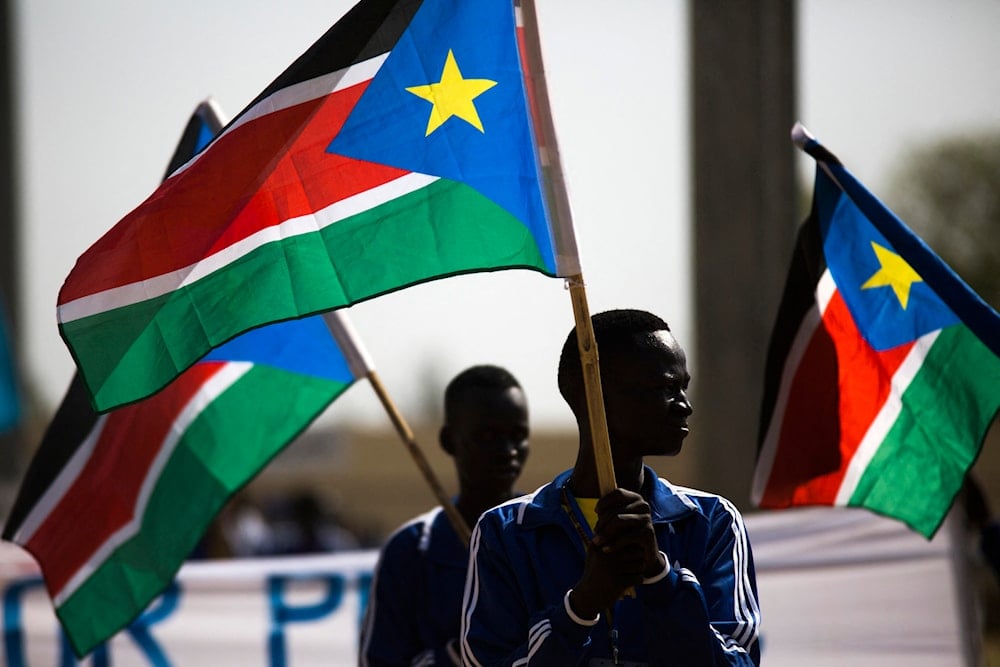US revokes visas for South Sudanese amid deportation row
US officials have warned that countries failing to promptly accept their citizens’ return will face penalties, such as visa sanctions or tariffs.
-
 Football players holding South Sudanese flags march at the Juba Stadium as part of the closing ceremony of the National Unity Day events in Juba, South Sudan, on January 23, 2016 (AFP)
Football players holding South Sudanese flags march at the Juba Stadium as part of the closing ceremony of the National Unity Day events in Juba, South Sudan, on January 23, 2016 (AFP)
The United States announced on Saturday that it would revoke all visas held by South Sudanese passport holders due to South Sudan's failure to accept the return of repatriated citizens.
This decision comes amid growing concerns in Africa about the possibility of a renewed civil war in the country.
The Trump administration has implemented stringent immigration enforcement measures, including the deportation of individuals deemed to be in the US illegally.
US officials have warned that countries failing to promptly accept their citizens’ return will face penalties, such as visa sanctions or tariffs.
In a statement, US Secretary of State Marco Rubio stated that South Sudan had failed to uphold the principle that all countries must accept the return of their citizens when another country, like the US, seeks to remove them.
"Effective immediately, the United States Department of State is taking actions to revoke all visas held by South Sudanese passport holders and prevent further issuance to prevent entry into the United States by South Sudanese passport holders," Rubio said.
"We will be prepared to review these actions when South Sudan is in full cooperation," he added.
Rubio emphasized that it was time for South Sudan’s transitional government to "stop taking advantage of the United States."
This marks the first time a specific country’s passport holders have been singled out for such a measure since Donald Trump returned to the White House on January 20, after campaigning on an anti-immigration platform.
South Sudan, the world's newest and one of its poorest countries, is currently facing internal political tensions. Some analysts fear the country could slip back into civil war, a conflict that claimed 400,000 lives between 2013 and 2018.
Under Joe Biden’s administration, South Sudanese nationals were granted "temporary protected status" (TPS), which is set to expire on May 3, 2025. TPS is a protection status granted to foreign nationals who cannot safely return to their home countries due to war, natural disasters, or other extraordinary circumstances.
As of September 2023, there were approximately 133 South Sudanese people in the US under TPS, with another 140 eligible to apply, according to the Department of Homeland Security.
However, the Trump administration has begun reversing TPS designations, revoking protection for over 600,000 Venezuelans in January. A federal judge temporarily halted this decision after questioning the government’s claims about the criminality of the majority of Venezuelans in the US.
According to the Pew Research Center, as of March 2024, 1.2 million people were either eligible for or receiving TPS in the US, with Venezuelans representing the largest group.
Meanwhile, African Union mediators arrived in South Sudan’s capital, Juba, this week to facilitate talks aimed at preventing a new civil war. This follows the house arrest of First Vice President Riek Machar, who has been accused by President Salva Kiir’s government of inciting rebellion.
Machar’s detention followed weeks of fighting in the Upper Nile state between the military and the White Army militia, with Machar's forces previously allied with the militia during the 2013-18 civil war.
Read more: South Sudan First VP arrested, triggering fears of civil war

 4 Min Read
4 Min Read









